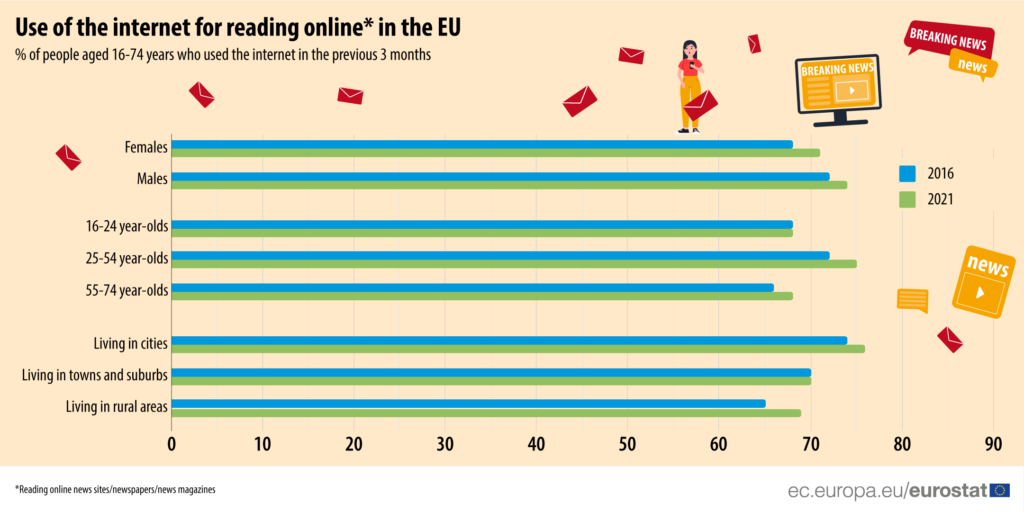Nine out of ten people in Cyprus aged between 16 and 74 years said they read online news in 2021, a percentage higher than the EU average, a Eurostat survey showed on Wednesday.
This is a significant increase from 2016, when around seven out of ten people on the island reported they use the internet to read news.
On a European level, around nine out of ten or 89 per cent of people aged between 16 and 74 years, used the internet at least once within the three months prior to the survey date in 2021 for reasons that included reading online news.
Data for 2021 show that 72 per cent of EU internet users aged 16-74 read online news sites, newspapers or news magazines, a two percentage point (pp) increase compared with 2016.
Among EU Member States, the highest percentages of internet users reading news online were registered in Finland (93 per cent), Lithuania and Czechia (both 92 per cent) and Croatia and Greece (both 90 per cent).
The lowest usage was reported in Romania (59 per cent), Germany (62 per cent), France (63 per cent), Italy (64 per cent) and Belgium (67 per cent).
In Cyprus, the percentage of internet users who used the internet specifically to read news websites, newspapers and magazines moved to 89 per cent in 2021, 16 percentage points higher than the 73 per cent in 2016.
The use of the internet for information increased more among women (up 3 percentage points) than among men (up 2 percentage points). But in general, more men than women in the EU responded that they get information from the internet (74 per cent compared to 71 per cent).
In Cyprus, the proportion among men was close to the proportion of women. In total, 89 per cent of men (compared to 76 per cent in 2016) and 88 per cent women (compared to 70 per cent in 2016) said they read online news.
When considering age, reading online news sites, newspapers and news magazines was the most popular in the 25-54 age group (75 per cent), followed by the 55-74 age group (68 per cent). Both age groups recorded increases of 3 pp and 2 pp, respectively. The 16- to 24-year-old group stood at 68 per cent, no change from 2016.
In Cyprus, 91 per cent of 25-54 year olds used the internet for information (an increase of 15 pp compared with 2016), 89 per cent of 16-24 year olds (an increase of 16 pp) and 82 per cent of 55-74 year olds (an increase of 5 pp).
The largest increase in the number of internet users in the EU who are informed online in relation to their region of residence was recorded in rural areas (from 65 per cent in 2016 to 69 per cent in 2021).
This was followed by people living in cities (from 74 per cent to 76 per cent). The percentage remained stable at 70 per cent for people living in small towns and suburbs.
In the case of Cyprus, the largest increase was recorded in cities (from 75 per cent to 95 per cent), followed by rural areas (from 71 per cent to 83 per cent) and small towns and suburbs (from 72 per cent to 80 per cent).
The survey also showed that people with high formal education were more likely to read news websites
In the EU, 85 per cent of people with a high level of formal education chose to get information online, compared with 57 per cent of those who had not achieved such a level of education.
Meanwhile in Cyprus, 96 per cent of people with a high formal education chose to get information online compared with 78 per cent of those without a high level of formal education.








Click here to change your cookie preferences